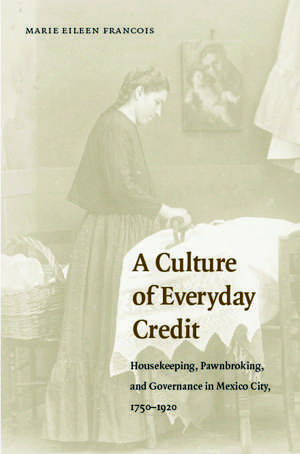A Culture of Everyday Credit: Housekeeping, Pawnbroking, and Governance in Mexico City, 1750-1920: Engendering Latin America
Autor Marie Eileen Francoisen Limba Engleză Paperback – 30 noi 2006
Pawning was the most common credit mechanism in Mexico City in the nineteenth century. A diverse, largely female pawning clientele from lower- and middle-class households regularly secured small consumption loans by hocking household goods. A two-tiered sector of public and private pawnbrokers provided collateral credit. Rather than just providing emergency subsistence for the poor, pawnbroking facilitated consumption by Creole and mestizo middle sectors of Mexican society and enhanced identity formation for those in middling households by allowing them to cash in on material investments to maintain status during lean times. A Culture of Everyday Credit shows how Mexican women have depended on credit to run their households since the Bourbon era and how the collateral credit business of pawnbroking developed into a profitable enterprise built on the demand for housekeeping loans as restrictions on usury waned during the nineteenth century.
Pairing the study of household consumption with a detailed analysis of the rise of private and public pawnbroking provides an original context for understanding the role of small business in everyday life. Marie Eileen Francois weighs colonial reforms, liberal legislation, and social revolution in terms of their impact on households and pawning businesses.
Based on evidence from pawnshop inventories, censuses, legislation, petitions, literature, and newspapers, A Culture of Everyday Credit portrays households, small businesses, and government entities as intersecting arenas in one material world, a world strapped for cash throughout most of the century and turned upside down during the Mexican Revolution.
Based on evidence from pawnshop inventories, censuses, legislation, petitions, literature, and newspapers, A Culture of Everyday Credit portrays households, small businesses, and government entities as intersecting arenas in one material world, a world strapped for cash throughout most of the century and turned upside down during the Mexican Revolution.
Preț: 209.63 lei
Nou
Puncte Express: 314
Preț estimativ în valută:
40.12€ • 41.73$ • 33.12£
40.12€ • 41.73$ • 33.12£
Carte disponibilă
Livrare economică 25 martie-08 aprilie
Livrare express 08-14 martie pentru 32.67 lei
Preluare comenzi: 021 569.72.76
Specificații
ISBN-13: 9780803269231
ISBN-10: 0803269234
Pagini: 416
Ilustrații: 10 illustrations, 67 tables
Dimensiuni: 152 x 229 x 15 mm
Greutate: 0.59 kg
Editura: Nebraska Paperback
Colecția University of Nebraska Press
Seria Engendering Latin America
Locul publicării:United States
ISBN-10: 0803269234
Pagini: 416
Ilustrații: 10 illustrations, 67 tables
Dimensiuni: 152 x 229 x 15 mm
Greutate: 0.59 kg
Editura: Nebraska Paperback
Colecția University of Nebraska Press
Seria Engendering Latin America
Locul publicării:United States
Notă biografică
Marie Eileen Francois is a professor of history at California State University, Channel Islands.
Recenzii
"Both for what she narrates explicitly about everyday life and what she suggests implicitly about the historiography, consumerism, and patriarchy, Marie Francois has written a significant and thought-provoking book that all Mexican scholars should read and ponder."—William H. Beezley, Hispanic American Historical Review
“Francois addresses an important issue that has never received much attention. She paints a vivid picture of an urban commerce dominated by women and made possible by the credit secured through pawnbroking. One of the works’ strengths is its multidisciplinary approach; it combines business and gender history, which should make it appealing to a wider variety of scholars. It is highly recommended.”—Jeremy Baskes, The Historian


















